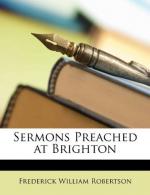so severe as to make the repetition of the offence
appear impossible; but the fatal habit is incorrigible:
to-morrow the tongue is at work again.
Neither can you stop the consequences of a slander; you may publicly prove its falsehood, you may sift every atom, explain and annihilate it, and yet, years after you had thought that all had been disposed of for ever, the mention of a name wakes up associations in the mind of some one who heard the calumny, but never heard or never attended to the refutation, or who has only a vague and confused recollection of the whole, and he asks the question doubtfully, “But were there not some suspicious circumstances connected with him?”
It is like the Greek fire used in ancient warfare, which burnt unquenched beneath the water, or like the weeds which when you have extirpated them in one place are sprouting forth vigorously in another spot, at the distance of many hundred yards; or, to use the metaphor of St. James himself, it is like the wheel which catches fire as it goes, and burns with a fiercer conflagration as its own speed increases; “it sets on fire the whole course of nature” (literally, the wheel of nature). You may tame the wild beast, the conflagration of the American forest will cease when all the timber and the dry underwood is consumed; but you cannot arrest the progress of that cruel word which you uttered carelessly yesterday or this morning,—which you will utter perhaps, before you have passed from this church one hundred yards: that will go on slaying, poisoning, burning beyond your own control, now and for ever.
3. The third element of guilt lies in the unnaturalness of calumny. “My brethren, these things ought not so to be;” ought not—that is, they are unnatural. That this is St. James’s meaning is evident from the second illustration which follows: “Doth a fountain send forth at the same place, sweet water and bitter?” “Can the fig tree, my brethren, bear olive berries, or a vine, figs?”
There is apparently in these metaphors little that affords an argument against slander; the motive which they suggest would appear to many far-fetched and of small cogency; but to one who looks on this world as a vast whole, and who has recognised the moral law as only a part of the great law of the universe, harmoniously blending with the whole, illustrations such as these are the most powerful of all arguments. The truest definition of evil is that which represents it as something contrary to nature: evil is evil, because it is unnatural; a vine which should bear olive berries, an eye to which blue seems yellow, would be diseased: an unnatural mother, an unnatural son, an unnatural act, are the strongest terms of condemnation. It is this view which Christianity gives of moral evil: the teaching of Christ was the recall of man to nature, not an infusion of something new into Humanity.




